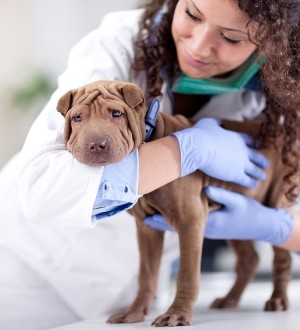- Do you subscribe to Dharma Dog Training’s Newsletter? You should.
- A Unique Campaign from The Humane Society of the United States
- Rabid bats in Omaha- Stay safe, prepared with these tips
- Springtime Activities in Omaha
- Mill Dog Monthly from Bailing Out Benji
- World Spay Day, Legislative Alert in Nebraska
- Attend the Nebraska Rescue Council’s monthly meeting this Saturday
- Five Hard-to-Ignore Reasons to Adopt!
- Paws in Pink to Benefit Breast Cancer Foundation
- VCA, Inc. Acquires MidWest Vet Specialists from Kansas State University
Let’s hope your pup doesn’t have any of these health issues!

A guest contributor to Pets in Omaha, Adam Conrad of Shih Tzu Expert, has recently told us about “trending” health issues he’s hearing about from his veterinarian pals. The list below is fairly exhaustive, so the point here is to stay on top of vet checkups and take the best advice you can get about prevention, intervention, and care. Check out Adam’s list below!
Trending health issues in dogs
Dogs are more resistant to diseases than humans, but they can get sick at any time. There are so many diseases in dogs, for which the old saying “prevention is better than cure” is always valid. But some are very frequent than others. That’s why it is essential for good pet owners to know these diseases, be mindful of their causes and try to prevent them as much as they could.
As you may know, dogs are most vulnerable in their early life and when they became too old. Just like humans are, puppies and senior dogs are more predisposed to illnesses. The reason behind this is that the immune system in puppies is still not mature enough to fight bugs. On the other side, senior dogs may inevitably suffer from failure of some organs or develop inherited diseases where there isn’t much vets can do. It is also worth the mention that some illnesses come as a result of lack or insufficient care. There are some diseases that are more common in some breeds and not in others. Plus, every age has its own risks. For instance, hunting dogs are exposed to some bugs that rarely hit toy breeds. Raw statistics from many veterinary offices are very helpful to be aware of some preventable health conditions. And here are the most common health conditions of dogs.
Everything you wanted to learn about pets could just be on this very useful website! And if you’re looking for the best in pet news and info in your email, check out pawcastle.com!
Most common diseases in puppies and junior dogs
Most people who keep puppies know that this is a critical period and are scared that their puppies get sick. But the truth is, well fed puppies who are kept in a clean environment can live happily till they get vaccinated. Most common diseases are gut and respiratory infections since puppies aren’t good bug fighters.
Gastroenteritis:
Puppies are very sensitive to their environment. Since their defensive mechanisms are not effective enough, bugs can infiltrate and colonize their gut. Parvovirosis is the most widespread viral disease in puppies and it is highly lethal. Parvo is very dangerous for puppies since it causes a serious gastroenteritis that may lead to dehydration. Vaccination against it could be done as early as 6 weeks of age. Older dogs are generally immune to this disease.
Diarrhea:
Diarrhea is quite common and has so many causes. Most diarrheas are benign and are treatable but some others are hard to overcome. Causes include infections, food intolerance, pancreatitis, … It is always recommended to visit your vet to rule out any severe infections like parvo.
Bronchitis
Bugs can infiltrate the respiratory tract and cause infections. coughing and nasal discharge are the common symptoms.
Distemper:
Canine Distemper is a very common viral disease in dogs. It is contagious and quickly alters the dog’s body. It is true that vaccination is available for it but vaccines can’t guarantee a complete protection.
skin and hair problems:
Skin and coat problems are very common. External parasites infest the skin, the hair and the ears. Fleas and ticks are quite common in dogs and they may cause other problems. Many owners don’t pay enough attention to their pets ears which can host parasites.
Most common diseases in senior (old) dogs:
Kidney diseases:
Kidney diseases are the most common factor of death in senior puppies. It may be inherited or due to repeated kidney stress like lack of water. Generally, kidney diseases are silent in their beginning and unfortunately there isn’t much vets can do for it.
Obesity:
Directly related to the dog’s diet. Generally, It is caused by high carb diets and sedentary lifestyle. Obesity can lead to other severe problems like heart diseases and diabetes.
Diabetes:
Just like humans, dogs can develop diabetes. Causes are congenital or immune (not fully understood). But High carb diets are a risk factor.
Bone and joint problems:
Arthritis and joint problems are common in older dogs. They may be caused by infections or consecutive to a disruption of the immune system. These problems require special attention.
Check out a home remedy for soreness from bestprotectiondogs.org/!
Teeth problems:
It is estimated that 80% of dogs over the age of 3 years suffer from some degree of periodontal disease that leads to bleeding gums, bad breath and in severe cases to teeth loss.
Eye problems:
these include cataract, trichiasis, Distichiasis, corneal ulcers, and injuries.
Cancer:
Cancer is the main cause of death and euthanasia in dogs. Cancer id the uncontrolled growth of cells in different tissues of the body. Although its causes remain quite ambiguous, there are no peculiar measures to prevent cancer.
General recommendations.
1. It is all about knowing your dog breed:
If you already have a dog, then knowing your dog breed characteristics is a good start. Every dog breed has its own trending health issues and you should be aware of them. If you intend to buy or adopt a puppy, there are some breeds that are healthier than others and they are more resistant to common diseases. The list includes the Border Collie, the Australian Shepherd, the Siberian Huskie, the English Springer Spaniels, the Shiba Inu, the Beagle, the Basenji, the Belgian Malinois, the Chihuahua, the German Pinscher, the Australian Cattle Dog …
2. Colostrum, colostrum, and colostrum:
The rule number one for Puppies: we’ll feed them with colostrum. Getting enough colostrum does not only help give your newborn puppies a good initial growth but also boosts the puppy immunity in this critical period.
3. Special care for puppies :
Isolate puppies from the outside world until they reach 3 or 4 months and get vaccinated. Always try not to mix young dogs with strange dogs. That’s because puppies are very sensitive to the load of bugs that other dogs or unhealthy places shed. Think of infection development in puppies as dose-dependent.
4. Healthy nutrition is the key:
Try to vary your dog food and do not stick to one type of food. Commercial dry foods are recommended because they are balanced, and their benefits outweigh their cons. Like the fact that they come in different categories that suit every life stage of the dog. But with time, dry foods are not kidney-friendly. Try feeding your dog on raw foods and homemade recipes from time to time. They have fresh ingredients and are free from chemicals that some scientists believe are causing allergy and cancer. Provide clean and fresh water permanently.
5. Good nutrition matters:
Nutrition quality is a key factor to prevent not only nutritional diseases but also the infectious ones. Always remember that the fewer you give carbs (grain, starch, pasta, potatoes, beans, …) in your dog’s diet, the better it is. Dogs can live their entire life normally without carbs since they can generate carbs from proteins and other foodstuff. Excess of carbs is the main cause of obesity and diabetes.
6. Vaccination:
Vaccines are meant to boost the immune system so that it becomes trained to tackle deadly viruses and bacteria. A common misconception that people have is that vaccinated puppies are immediately protected. Well not. Vaccines take some time to take effect on the body. So don’t walk your puppy around until one month after his first complete vaccination. Vaccines lose their effect with time and this is why they are routinely repeated every year. Try to respect your vaccination schedule.
7. Antiparasitic drugs are not a choice:
Along with vaccines, antiparasitic drugs are important to make your dog get rid of external and internal parasites. Parasites hide in the skin, the ears, the gut, and their harm is often underestimated. For instance, fleas and ticks could carry bugs between dogs.
8. Regularly brushing your dog’s teeth:
Start brushing your dog teeth in his first month of age. Use a toothbrush and a toothpaste made for dogs. Special toothbrushes have soft bristles so that you don’t harm the gum (Gingiva). If not so, A kid’s size toothbrush is can do the job.
9. Regular veterinary checks:
Taking your dog to the vet every year or two is important to early check his health condition.
If you have many dogs:
Keep them in clean and dry place and try not to mix different ages together. Older dogs usually shed viruses and bacteria that may compromise younger dogs.
Knowing trending diseases is what makes good pet owners. It is important to get an idea on how to prevent your dog from developing diseases. Dogs aren’t good at abiding by the good health rules and it is up to you to offer them a healthy lifestyle.
Related Posts
Latest News
-
What Signs to Look For When My Pet Has a Cold
You have probably heard the expression, “sick as a dog.”...
- Posted 2 weeks ago
- 0
-
How Often Should I Groom My Pet?
Do you have a grooming ritual for your furry friend?...
- Posted 3 weeks ago
- 0
-
From Kibble to Cuisine: Finding the Perfect Food For Your Pet
Do you ever wonder what the difference is between regular...
- Posted 1 month ago
- 0
-
The Essential Guide to Pet Care: Meeting Your Furry Friends Basic Needs
Are you a first-time pet owner and need to know...
- Posted 1 month ago
- 0
-
Say Cheese! Tips for Keeping Your Pet’s Pearly Whites Clean
Did you know that keeping your dog or cat’s teeth...
- Posted 2 months ago
- 0
-
Feeding Frenzy: How Often Should You Fill Your Pet’s Bowl?
Are you unsure how much food to give your dog...
- Posted 2 months ago
- 0
-
How to Prepare Your Pet for Spring
Winter is in full force, but spring will be here...
- Posted 2 months ago
- 0























You must be logged in to post a comment Login